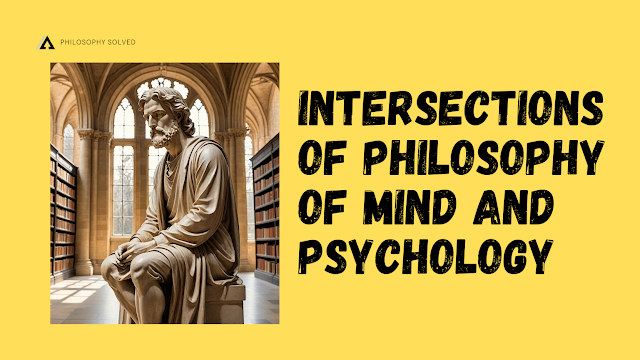The relationship between the philosophy of mind and psychology is complicated and complementary at the same time. Each tries to grasp the notion of the mind and behavior but through different standpoints and methodological approaches. Philosophy of mind is the branch of philosophy that deals with the nature of consciousness, mental states, and the relationship between the mind and the body; it raises basic questions about the nature of experience and thought. Psychology, on the other hand, is a science that deals with behavior, cognition, and emotions through empirical methods and experiments. Despite these differences, the two fields meet at important junctures to further our understanding of the mind, both philosophically and scientifically.
1. Philosophy of Mind: Defining the Domain
The philosophy of mind explores some of the deepest questions about consciousness and the nature of mental phenomena. Among the most central questions within this domain are:
- **What is consciousness?** How do subjective experiences come about from physical processes in the brain?
- **What is the mind?** Is the mind identical to the brain, or is it something more?
- **What is the relationship between mental states, for example, beliefs and desires, and physical states, for example, brain activity?**
- **What is intentionality?** How can mental states represent things, even things that don't exist?
Philosophers of mind are concerned with the metaphysical, epistemological, and ethical implications of mental life. They are often questions about the *nature* of mental states-are they physical or non-physical?-and about how these states *interact* with the physical world, especially the brain and the body. The philosophical positions include dualism, the theory that mind and body are separate substances; materialism, the theory that mental states are wholly physical; and functionalism, an emphasis on mental states in terms of their causal roles, independent of the material that implements those roles.
2. Psychology: A Scientific Approach to the Mind
Psychology emerged as a separate discipline from philosophy, but now it is more empirical and experimental in nature. It deals with human behavior, cognition, emotion, and mental processes through experiments, surveys, observations, and clinical studies. Key areas of psychology include the following:
* **Cognitive psychology** encompasses mental processes related to perception, memory, problemsolving, and decision-making.
* **Behavioral psychology**, also known as behavioral science, studies how behavior is molded by the environment and conditioning.
- **Neuropsychology** studies the brain's role in behavior and cognition.
- **Clinical psychology** involves the diagnosis and treatment of mental health disorders.
Psychology does not usually engage in the ontological questions of mental states-that is, whether they exist independently of physical processes-but it does investigate their manifestations and how they can be measured, quantified, and understood in practical terms. The field relies heavily on empirical data and experimentation, using methods like neuroimaging, behavioral tests, and longitudinal studies.
3. Key Intersections Between Philosophy of Mind and Psychology
Despite their diverging methodologies, there is much common interest between the philosophy of mind and psychology, and they interact regularly.
A. Mind-Body Problem
The most central point of interaction probably involves the mind-body problem: the relation of mental states-thoughts, feelings, and perceptions-to physical states-brain activity and neural structures. Philosophy of mind has debated the nature of the relation at issue-whether the mind is purely physical or whether it contains a non-physical element-and psychology, lately neuropsychology, provides essential empirical information that supplements such debates by researching how changes in structure and function of the brain impact cognition and behavior.
For instance, when philosophers raise the question as to whether consciousness can be reduced to brain states, psychologists contribute by providing evidence from brain imaging studies (such as fMRI scans) indicating what parts of the brain are most active during a particular mental task, hence giving empirical credence to the arguments for or against the mind's reduction to the brain.
B. Consciousness and Qualia
Consciousness, especially the phenomenon of *qualia*-that is, the subjective experience of "what it's like" to be in a particular mental state-is another place of convergence for the two disciplines. Philosophers argue, for example, Thomas Nagel, that conscious experience cannot be fully explained by physicalist or reductionist accounts of the brain. Psychological studies on perception and consciousness, by contrast, investigate how conscious awareness arises from neural processes, in an attempt to bridge the explanatory gap between subjectivity and functioning of the brain.
C. Mental States and Behavior
Psychology studies how mental states-things like beliefs, desires, intentions-produce observable behavior. The philosophy of mind often tries to make sense of what the mental states consist in-their nature, their existence, whether they can be reduced to purely physical or functional terms. Both are concerned with the way the mind influences behavior, though philosophy may question whether behavior is a good enough proxy to understand mental life, while psychology assumes observable behavior is a necessary part of the mental process.
D. Cognitive Science: A Bridge Between the Two
Cognitive science is an interdisciplinary research area whose valuable insights involve psychology, neuroscience, artificial intelligence, linguistics, and philosophy. It turned out to be one of the big platforms where philosophy of mind and psychology met. Cognitive scientists are much concerned with an account of mental processes and their computational representation. This is particularly evident in how the philosophers of mind engage with cognitive science to discuss theories of cognition, perception, memory, and learning, while psychologists use such theories to set up experiments and modify models of how the brain works.
E. Ethics and the Nature of Mental Health
Another point of convergence pertains to the ethical issues about mental health. Philosophical questions relating to autonomy, personal identity, and mental illness have profound implications for psychological practice. For example, questions concerning what exactly is a "normal" mind, how we define mental disorders, and the ethical responsibilities connected with therapy or psychiatric treatment are not only empirical but deeply philosophical. While psychology could provide insights about the way in which mental disorders manifest, how they can be treated, or which interventions are most effective, philosophy frames issues in light of human rights, agency, and the very nature of suffering.
4. Conclusion: A Dynamic Relationship
The relationship between philosophy of mind and psychology is one of mutual enrichment rather than mere division. While the philosophy of mind provides a conceptual and theoretical framework from which to understand deeper natures of mental phenomena, psychology offers the empirical evidence and a more refined methodology in studying the mind in action. While psychology has considerably furthered the knowledge on the mechanisms of cognition, emotion, and behavior, the questions posed by philosophers on the nature of consciousness, personal identity, and mental causation continue to raise challenges and inspire new research in psychology. Together, these two disciplines contribute to a richer and more nuanced understanding of the mind and help bridge the gap between abstract theory and practical application.
Both will ultimately be required for the explanation of what it is to be a thinking, feeling, and conscious being in a complex, physical world. The continued debate between philosophy of mind and psychology will most likely remain one of the most exciting and profound intellectual pursuits of the 21st century.






0 Comments